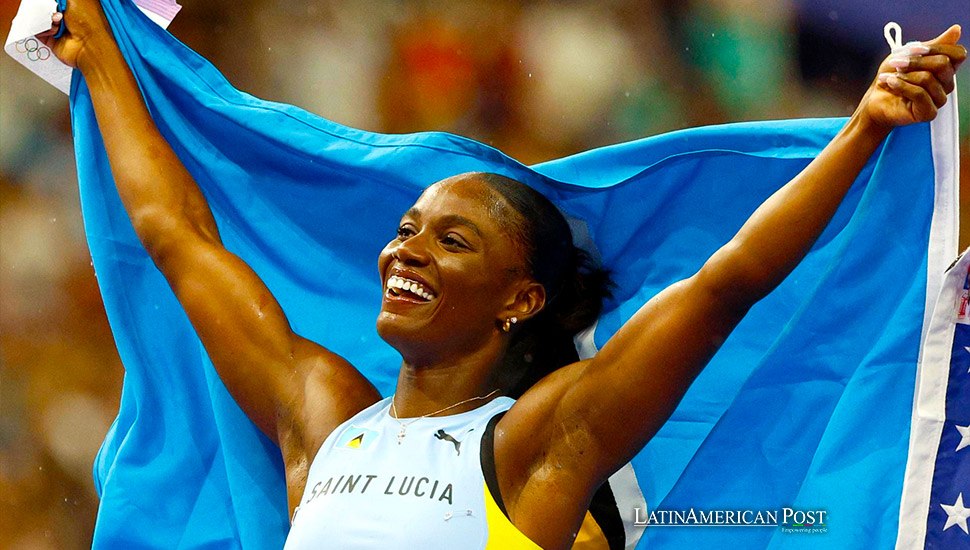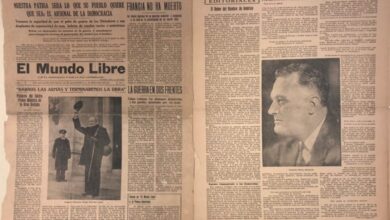Latin American and Caribbean Nations Still Seeking Olympic Glory

Dominica and St. Lucia celebrated their first-ever Olympic gold medals, inspiring hope for other Caribbean Latin American nations striving for their first podium finish.
If it feels like the same countries are winning most of the Olympic medals every two years, that’s because it’s largely accurate. Even though more than 150 countries and territories have claimed a medal since the modern Games began in 1896, the list of winners is top-heavy. Entering the Paris Summer Games, the United States has the most, by far, with 2,975 medals, according to the International Olympic Committee’s research wing. A group of usual suspects follow: the former Soviet Union (1,204), Germany (1,058), Great Britain (955), and France (898).
Nearly 70 countries and territories—roughly a third of the parade of nations—cannot boast an Olympic medalist in any discipline, summer or winter. Some of these are Caribbean and Latin American countries, including Bolivia, Honduras, El Salvador, Nicaragua, Barbados, and Haiti.
Every once in a while, though, a new nation joins the club. On a memorable Saturday night at the Stade de France, Thea LaFond-Gadson, 30, of the Caribbean island of Dominica, leaped to victory, winning the gold medal in the women’s triple jump. And Julien Alfred, 23, of St. Lucia, also in the Caribbean, sprinted her way to glory, winning the women’s 100-meter sprint gold medal. Each medal was the first for their nation, a testament to the power of perseverance and the potential for new champions to emerge.
“It means a lot to the small islands,” Alfred said. “And seeing how we can come from a small place but also be on the biggest stage of our career.”
For countries and territories that have always competed in vain, Saturday’s medalists provided renewed hope for countries yet to attain Olympic glory, such as:
Latin American Nations
- Bolivia: Bolivia’s athletes have participated in both the Summer and Winter Games, showcasing their talents in marathon running and alpine skiing events. The country’s high-altitude terrain presents unique challenges for training and competing, but Bolivian athletes continue to strive for excellence.
- Honduras: Honduran athletes have made their mark in soccer, boxing, and track and field. The nation’s love for football is evident in its passionate fan base and the commitment of its athletes to represent Honduras on the world stage.
- El Salvador: El Salvadorian athletes have competed in swimming, weightlifting, and archery. The country’s rich cultural heritage is reflected in its sporting traditions, and its athletes continue to work hard to achieve Olympic success.
- Nicaragua: Nicaraguan athletes have participated in baseball, boxing, and weightlifting. The nation’s passion for baseball is well-known, and its athletes aspire to bring home a gold medal someday.
Caribbean Nations
- Barbados: Barbadian athletes have competed in athletics, boxing, and sailing. The country’s rich sporting history includes notable athletes such as Obadele Thompson, a sprinter who won bronze in the 100 meters at the 2000 Sydney Olympics.
- Haiti: Haitian athletes have participated in judo, athletics, and weightlifting. The nation’s resilience in the face of adversity is reflected in its athletes’ determination to succeed on the world stage.
“I want to make my country happy and show that anything is possible,” said Héctor Garibay, 36, a marathoner Bolivians hope to finally get their country on the medals table.
Bolivia, a South American country of 12 million, attended its first Games in 1936. In 22 trips to the Olympics—15 Summer Games and seven Winter Games—it has never sent an athlete to the medal podium. According to the I.O.C., the only countries with more Olympic appearances and equally unsatisfying results are Monaco (32 times) and Andorra (25).
The Struggles of Caribbean and Latin American Countries
The list of countries and territories yet to win an Olympic medal is a reflection of history, politics, and economics. It includes small ones like Belize, Honduras, and Nicaragua, and underprivileged ones such as El Salvador and Bolivia. These countries face significant economic challenges and limited resources, which pose a hindrance to their ability to develop top-tier athletes and compete at the Olympic level.
“It’s frustrating, definitely,” said Marco Luque, a member of the Bolivian Olympic Committee’s board and the president of his country’s track and field federation, told the New York Times (NYT). “And you feel the impotence of being unable to do better.”
Luque said Bolivia’s national Olympic committee receives no direct government funding and relies on Olympic solidarity funding and other donations. That money, he said, is distributed to the country’s sports federations, with sums ranging from $4,000 to $7,000 a year. But qualifying for specific sports, Luque said, requires lots of travel, “and spending a lot of money on international competitions with $7,000 a year is impossible.”
Overcoming Economic Hurdles
Money isn’t everything. According to the World Bank, Monaco has a gross domestic product per capita of $241,000, the highest in the world, but a population of 36,000, one of the smallest. “Smaller countries have less of a talent pool than larger countries,” Kirani James, 31, a sprinter from Grenada, told the NYT. He speaks from experience: His Caribbean island has 125,000 residents, yet he brought home its first medal, a gold in the 400-meter dash, in 2012. (He won silver and bronze in subsequent Olympics.)
James received a hero’s welcome, a government payout worth roughly $185,000, and a commemorative stamp. He was appointed a Grenada tourism ambassador and a stadium was named after him, which he called a “huge honor.” He said he was happy to do something “that gives Grenadian people a sense of pride and identity.”
Despite its size, Cuba (11 million) punches far above their weight because of deliberate government spending.
The I.O.C. also tries to boost participation from less represented countries and territories through universality places or wild-card spots in events. Luque said Bolivia’s national Olympic committee receives no direct government funding and relies on Olympic solidarity funding and other donations. That money, he said, is distributed to the sports federations in the country, with sums ranging from $4,000 to $7,000 a year.
The Role of Government and Community Support
The list of countries yet to win an Olympic medal reflects a complex interplay of historical, political, and economic factors. Many Latin American and Caribbean nations face significant challenges in their pursuit of Olympic glory, stemming from limited resources, lack of infrastructure, and socioeconomic disparities.
The scarcity of resources is a common theme among many Latin American and Caribbean nations. It makes investing in training, nutrition, facilities, or stipends for athletes difficult. Additionally, the high cost of qualifying for specific sports, which often involves extensive travel and participation in international competitions, further exacerbates the financial burden on these countries.
While money is not the sole determinant of success, it plays a crucial role in developing and nurturing athletic talent. Smaller countries, such as those in the Caribbean, often have a limited pool of potential athletes. This, coupled with financial constraints, makes it even more challenging to produce Olympic medalists.
Despite these challenges, some Latin American and Caribbean nations have made significant strides in the Olympic Games. Jamaica, for instance, has excelled in track and field events, securing numerous medals despite its relatively small population (2.8 million). This success can be attributed to strategic investments in sports, which gives the country a natural advantage.
Recognizing the need to address these disparities, the I.O.C. has implemented a solidarity program to support athletes and coaches from countries with the greatest financial need. Between 2021 and 2024, the I.O.C. committed $590 million to this program, emphasizing that talent and determination alone are not enough to reach the top in the modern sports landscape.
Pursuing Olympic medals goes beyond national pride; it fosters cultural exchange and provides valuable learning opportunities for athletes from different countries. However, due to their numerous challenges, securing an Olympic medal remains a distant dream for many Latin American and Caribbean nations.
Also read: Kimberly García: Peru’s Golden Hope for Olympic Glory
These nations’ journey towards Olympic success requires a multifaceted approach. Increased government support, strategic investments in sports development programs, and greater access to resources and facilities are crucial steps towards leveling the playing field and enabling these countries to showcase their athletic talent on the global stage.





